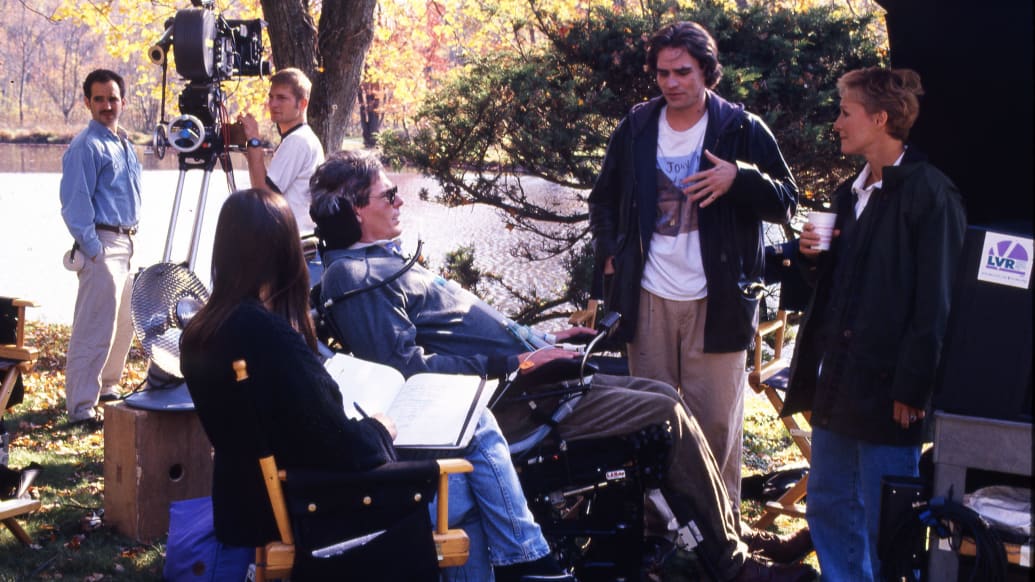PARK CITY, Utah—There have been many Men of Steel and yet there’s only one true Superman: Christopher Reeve, whose turn in Richard Donner’s 1978’s blockbuster simultaneously established the template for big-screen superheroes and its charismatic leading man as the epitome of all-American gallantry and virtue. Thus, when Reeve was left paralyzed and unable to breathe on his own by a catastrophic 1995 horse-riding accident, it resounded as not just a tragedy but as a grave injustice that this larger-than-life icon of invincibility and good had been brought so low. Such reactions were, in a sense, silly, since everyone knew that Reeve wasn’t actually Superman. Still, his misfortune nonetheless felt fundamentally, cruelly wrong—a testament to the power of the movies and, also, to his charisma, talent and character.
Reeve would demonstrate those qualities for many amazing years following his accident, becoming an advocate for spinal cord research and, more broadly still, for the disabled community. Ian Bonhôte and Peter Ettedgui’s heartfelt bio-doc Super/Man: The Christopher Reeve Story—which premiered at this year’s Sundance Film Festival—captures both sides of the late artist, who passed away in 2006. It’s rare that any figure inspires the public in the way that Reeve did as DC Comics’ legendary Kryptonian, such that even today, there’s no serious debate about the finest actor to ever don the blue-and-red cape and tights. That he arguably made a greater impact on the globe in the aftermath of his calamity, however, marks him as truly unique and admirable, and is stirringly lionized by this tribute to his life and legacy.
A conventional, well-assembled compendium of film and media clips, home movies, and talking-head remembrances, Super/Man: The Christopher Reeve Story recounts the before and after portions of Reeve’s tale at the same time, flip-flopping between his ascension to the top of the superhero mountain with his struggle to survive, and cope with, the severe injuries suffered in his fateful equestrian fall. That dual-chronological structure allows the directors to find harmonious parallels between then and now, as well as to highlight the differences between the matinee idol everyone saw and adored on the screen (at least when he was saving the day) and the more complicated, thoughtful, and ambitious partner, father, and husband that he was off-camera. The documentary isn’t formally flashy, and given the subject at hand, even a clumsier affair would have likely had no trouble moving audiences to tears. Yet with grace and accuracy, it hit its waterworks-inducing marks.
Super/Man: The Christopher Reeve Story paints a rich portrait of Reeve as an individual, celebrity, activist, and family man, bolstered by commentary from his children and friends and, additionally, from Reeve himself, courtesy of clips from the audiobook of his autobiography. Raised in a splintered household and desperate to please his formidable poet dad, Reeve sought solace in the theater, and while performing in an Off-Broadway production with co-stars Jeff Daniels and William Hurt (!), he landed the audition of a lifetime to test for Superman. Over Hurt’s vehement objections, he gave it a shot and nabbed the role. Months later, with the film a box-office sensation, Reeve was the high-flying toast of Hollywood, and as he states in one of numerous archival interviews, the sole way he managed to keep his feet on the ground was via his relationship with Gae Exton, a modeling executive with whom he’d subsequently have two children (Matthew and Alexandra) but never marry.
Christopher Reeve and his family
Mirrorpix
Sequels would follow, as would Reeve’s waning interest in the franchise and frustration with being pigeonholed as a fantastical ideal. A course correction, however, was on the horizon, albeit not professionally. Mere months after splitting from Exton, Reeve met Dana Morosini and fell madly in love. In the ensuing years (which brought a third child, William), they achieved the type of warm, supportive, joyous domesticity that Reeve had always craved. As recalled by Matthew, Alexandra, and William, not to mention dear friends Michael Manganiello, Susan Sarandon and Glenn Close, they were a perfect match, their personalities supremely complementary and their passions—for art, kids, and all manner of athletic pursuits, be it skiing, tennis or horseback riding—totally in sync.
Everything changed on May 27, 1995, when Reeve took a tumble off his steed, opening a new chapter that, as he and others describe, was terrifying, agonizing and ultimately a catalyst for reconfiguring priorities and turning an unthinkable negative into an altruistic positive. Super/Man: The Christopher Reeve Story revisits Reeve’s efforts to endure, and ultimately to normalize disability in order to stimulate action on the part of people, organizations and governments to fund research to improve the situations of hundreds of thousands of Americans. With Dana, his kids, and his Julliard roommate and lifelong best friend Robin Williams by his side, he refused to quit on himself or his mission, whether it was by speaking at the Oscars and the Democratic National Convention, returning to acting and directing, or doing everything in his power to regain the abilities he’d lost.

Christopher Reeve
Ken Regan/Camera 5
Also tenderly touching upon Dana’s own arduous experience (and admirable work) throughout this ordeal, Super/Man: The Christopher Reeve Story benefits from the first-hand input of the Reeve kids, who are now leaders at the Christopher & Dana Reeve Foundation, and whose anecdotes afford the material its intimacy. There are no bombshells to be found in Bonhôt and Ettedgui’s doc, which celebrates Reeve as a performer and a human being, and defends the occasionally controversial choices he made, from multiple angles. Despite the considerable results of his crusade on behalf of the disabled (and the uplifting example it set), it’s almost impossible to not think of Reeve’s saga as brutally unfair, especially given that, less than a year after his passing, Dana succumbed to out-of-the-blue lung cancer. Nevertheless, the film finds hope in its sadness, recognizing that no matter how terrible life can be, it’s also worth fighting for so long as there are children and spouses to love, friends to laugh with and rely upon, pastimes to enjoy, and that precious thing which Superman embodies more than any other: hope.







